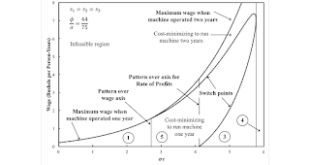So my computer crashed. I hadn't backed it up in a while. But, even so, my backup failed, too. I am currently paying for some specialist organization to restore the data, and they are on their third attempt. The cost seems a lot for an individual, but I feel like I need a lot that is on it. I am going to buy a new computer, and I have been slow about this. Until I do this, I will not be able to post any mathematical examples. I think that I have posted enough that I can recreate these...
Read More »Selected Difficulties In Reading Marx’s Capital
Infinite are the arguments of Marxists. This very selective survey needs references. A first difficult is that everybody knows Marx has something to do with the Soviet Union. Many come to reading Capital with certain preconceptions. A couple comments in the book, for analytical reasons, contrast capitalism and feudalism and a post-capitalist economy with common ownership. But the book is about capitalism. The book contains expressions of outrage, often ironical. But is capitalism...
Read More »Paul Davidson (23 October 1930 – 20 June 2024)
Overview Paul Davidson took Keynes' General Theory of Employment Interest and Money seriously. The interpretation in mainstream textboooks misses important points. Keynes' book was about theory, not primarily about (short-run?) fiscal or monetary policy. Keynes does not explain persistent unemployment from imperfections or sticky or rigid money wages or prices. A general theory is one that has less axioms than the special case treated by, say, Marshall. Davidson identified, specifically,...
Read More »Alexander Harrington Corrects Professor On Hegel’s Dialectic
Michael Harrington was a great socialist in the United States. This is not to say that he did not make some political missteps, at least at Port Huron. Isserman's biography seems to have Michael making political missteps throughout the 1950s and 1960s. His son Alexander had exposure to some hard-to-understand ideas before he got to college: My older son, Alexander, began to read Dostoevsky on his own when he was about fifteen and once told a college professor who was explaining Hegel's...
Read More »A Robinson Crusoe Story
1.0 Introduction I wrote this decades ago. Here is a simple parable. Consider an island with a particularly simple society with two people, Robinson and Friday. Robinson and Friday live on one good, call it corn. At the start of our story, Robinson and Friday have just finished a feast. Both Robinson and Friday have each eaten food baked out of 50 bushels of corn. Also, Robinson has 50 bushels corn remaining. Friday, perhaps because he's newly arrived, has none. 2.0 The Initial Deal...
Read More »Prices Of Production Before Labor Values
1.0 Introduction This post outlines an unoriginal argument against Marx's version of the Labor Theory of Value (LTV), if that is the right name. Somehow, this post was obliquely inspired by Fabio Petri's recent working paper. Suppose technology, net output, and the real wage are given. Then the rate of profits and prices of production are determined. Suppose that the technology provides a choice of technique. Then the determination of the choice of technique requires an analysis at...
Read More »Why Is Reswitching Empirically Rare?
Figure 1: Variation in the Economic Life of a Machine with Technical Progress Exploration of the effects of perturbations of model parameters in the analysis of the choice of technique has suggested an answer to this question to me. I am not sure how well-developed the argument in this post is. The question is raised by empirical results, particularly by Han & Schefold and by Zambelli. I have previous commented on Zambelli. Heinz Kurz has recently questioned the reliability of these...
Read More »Communism Worked In Central New York Around 1500
A Beach On The East End Of Oneida Lake The Iroquois are an example of primitive communism. This post includes lots of anachronisms, and I use current place names. I had never heard of the Haudenosaunee before, which apparently is the preferred term. I find I do not know much about my neighbors, the Oneidas. The Oneidas were one of the five nations in the Iroquois confederacy. I am confused whether primitive capitalism is tied exclusively to hunter-gatherer societies, without a surplus...
Read More »David Champernowne
No book-length biography of D. G. Champernowne exists, as far as I can see. Even his Wikipedia page is quite terse. Yet he advised and participated in important twentieth-century intellectual developments. From Hodges biography of Alan Turing, I learned that 'Champ' was a friend of his. Champernowne did early work in programming chess-playing algorithms, along with Turing and Claude Shannon. Game-playing is one of those disappointing applications of Artifical Intelligence. What seems to...
Read More »Future Papers For My Research Program?
I have sometimes written retrospectives about my research program. I have been exploring the results of perturbing parameters in models of the choice of technique. This is a bit more prospective. Illustrations of One-Dimension Pattern Diagrams: I have a selection of these written up. Independence of Economic Life of Machines and Capital-Intensity: I have the analytical results I want. I am being slow to read what I need to connect results up to Austrian capital theory. I have had a much...
Read More » Heterodox
Heterodox


